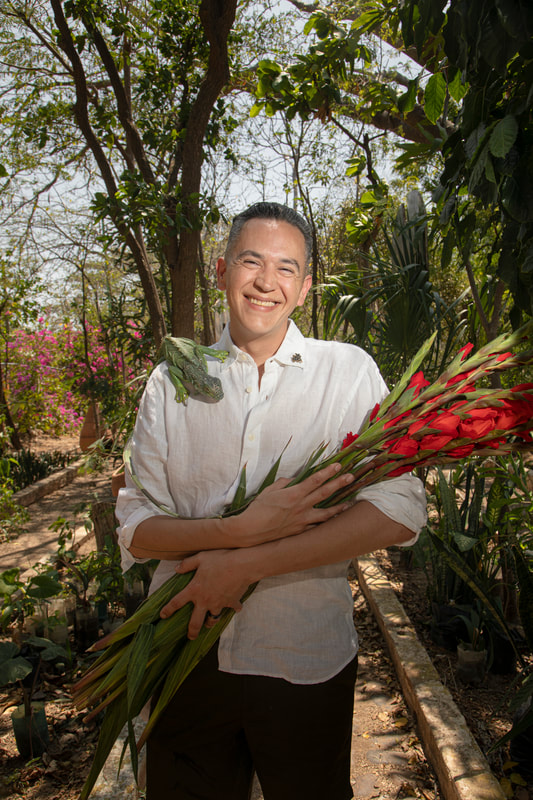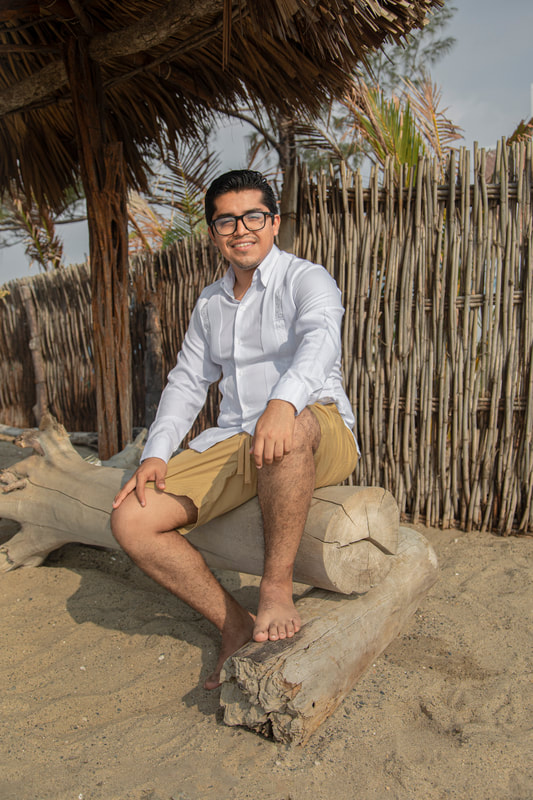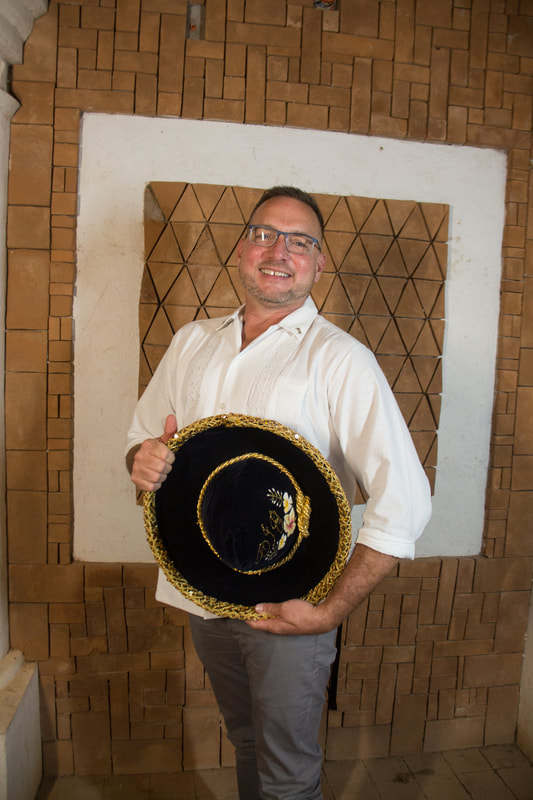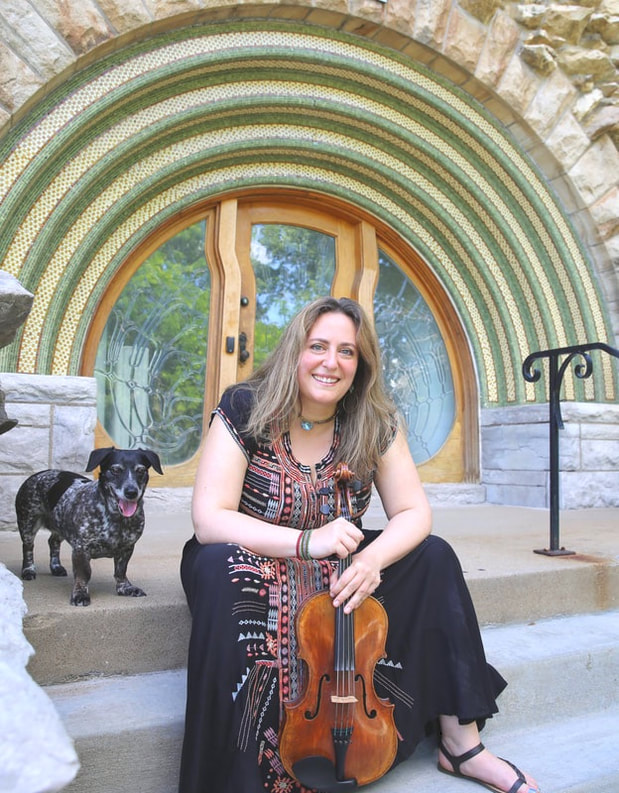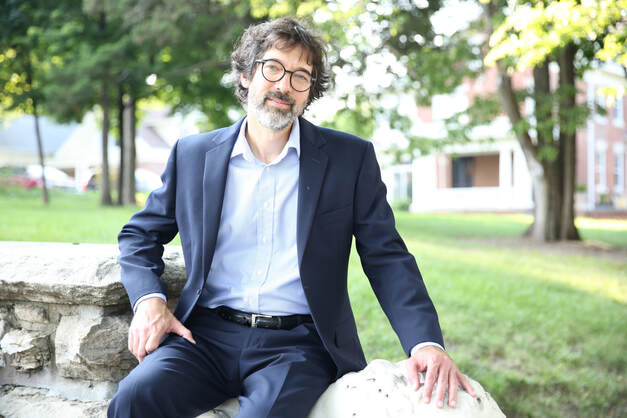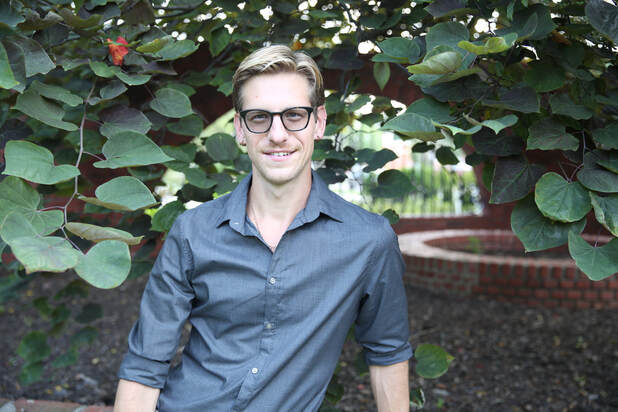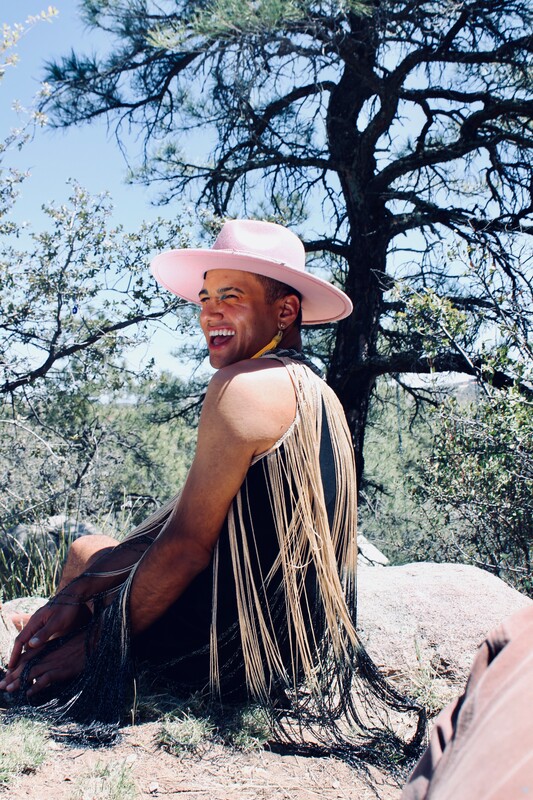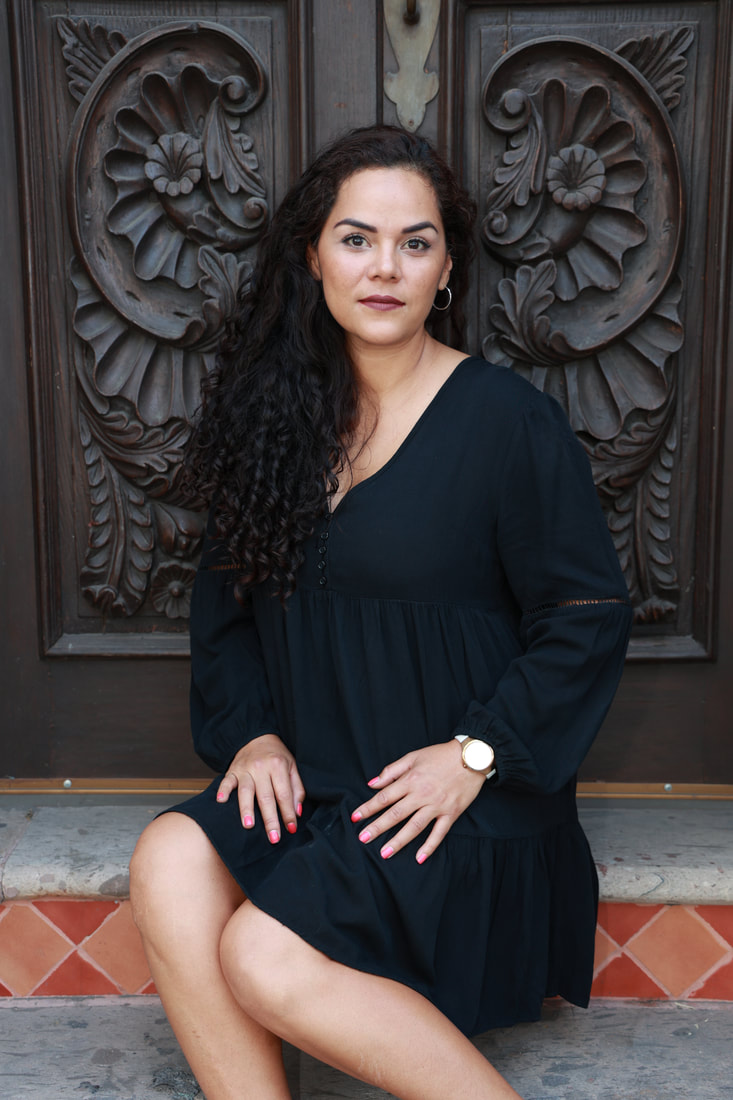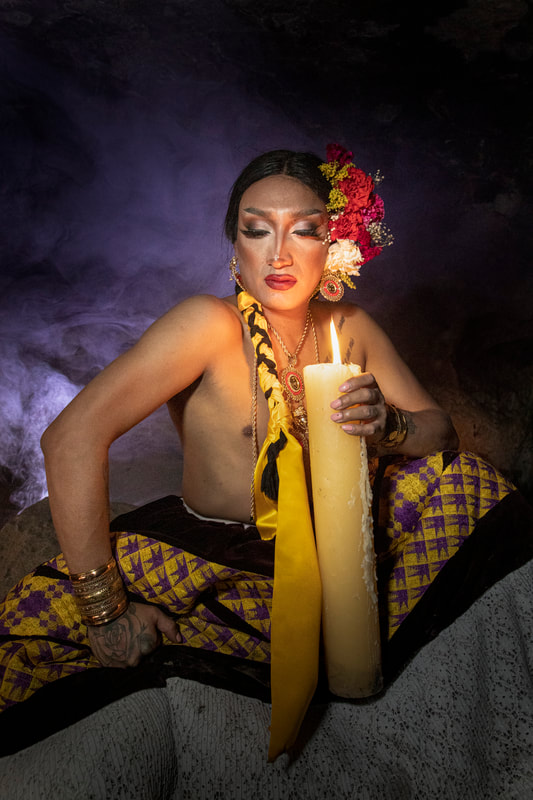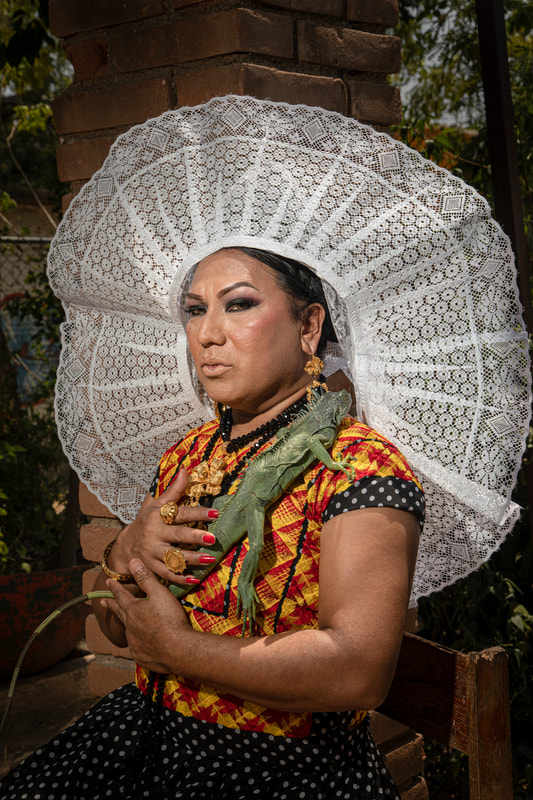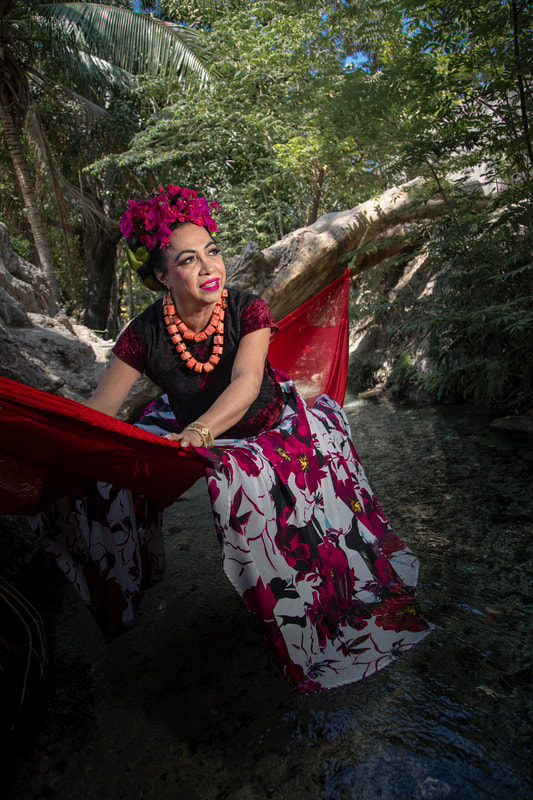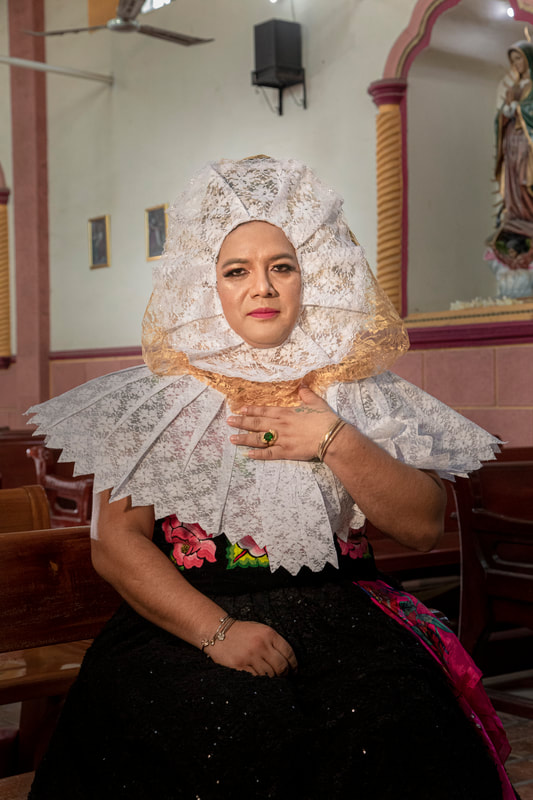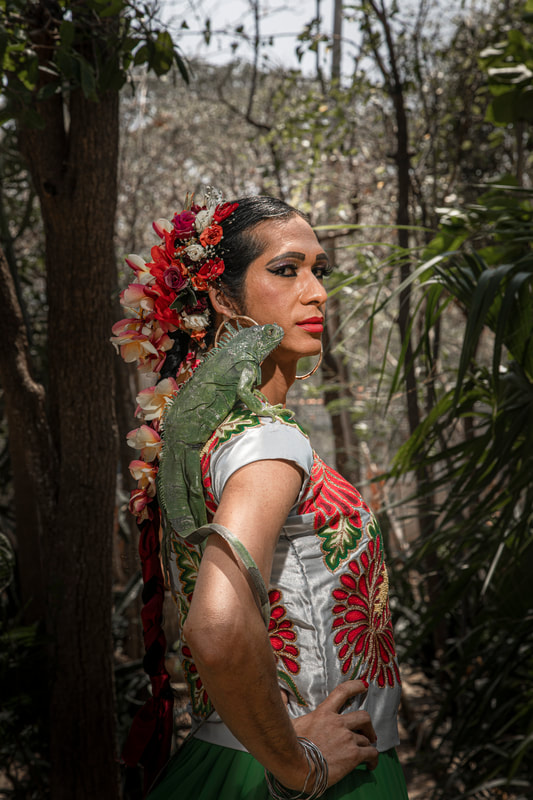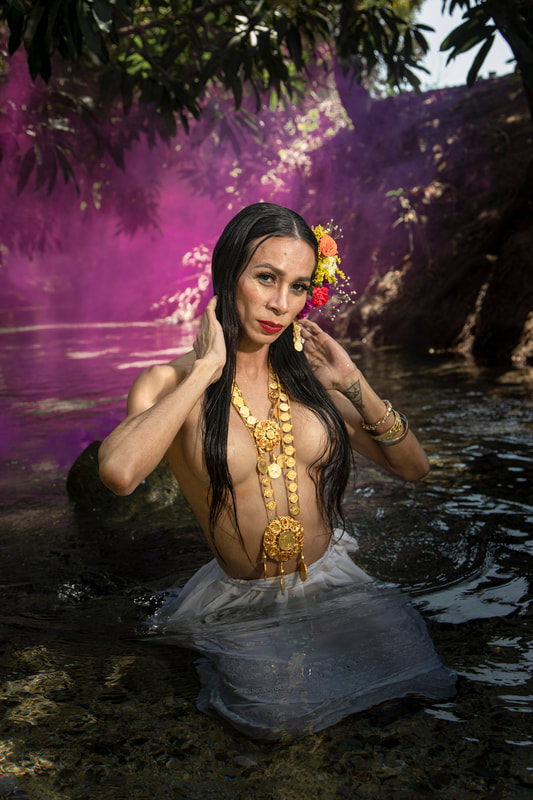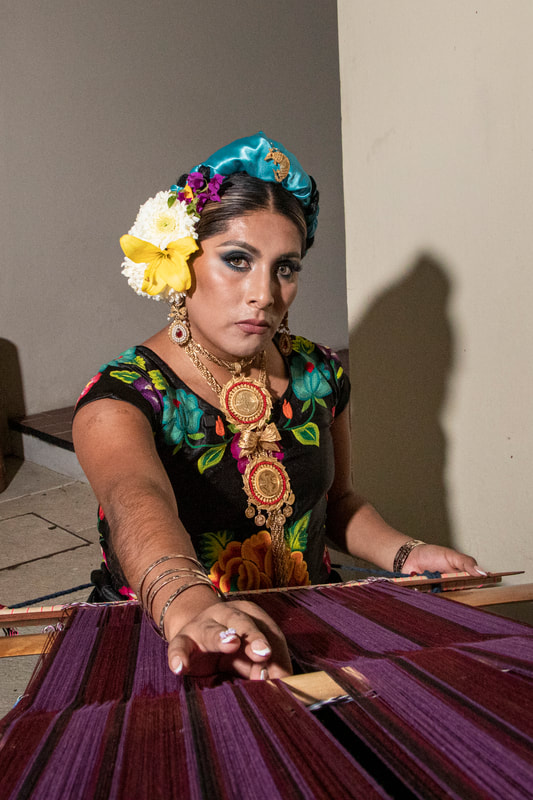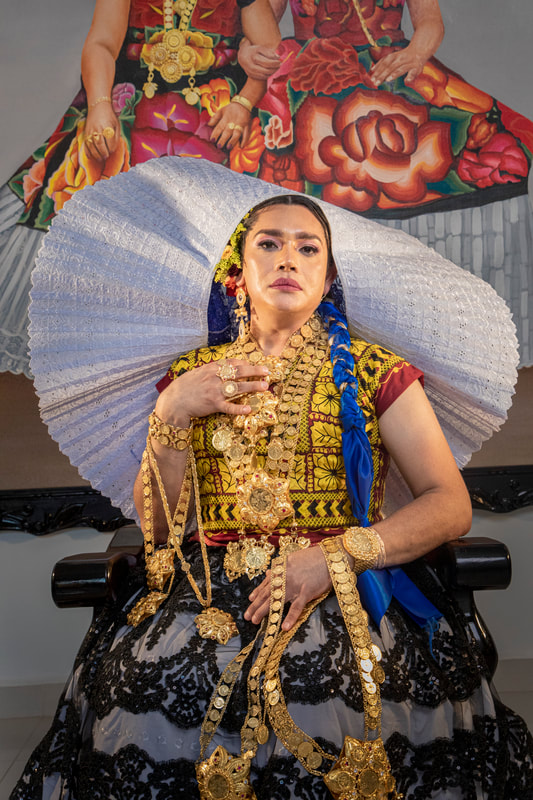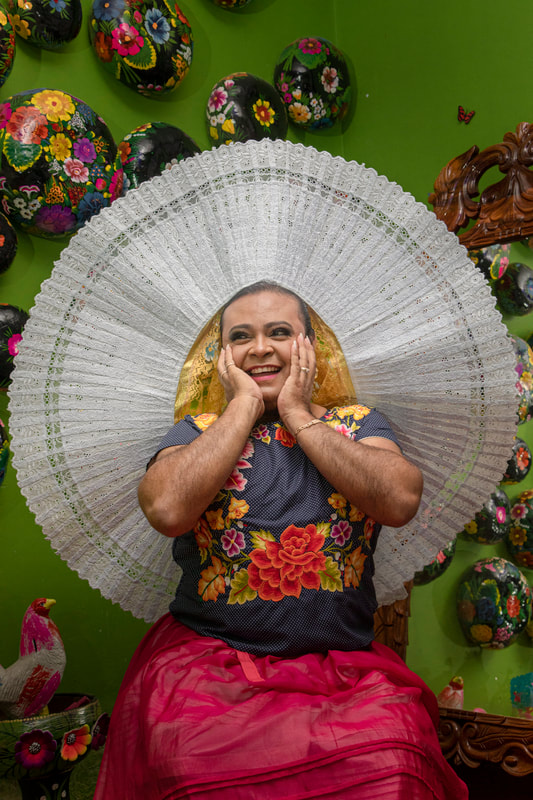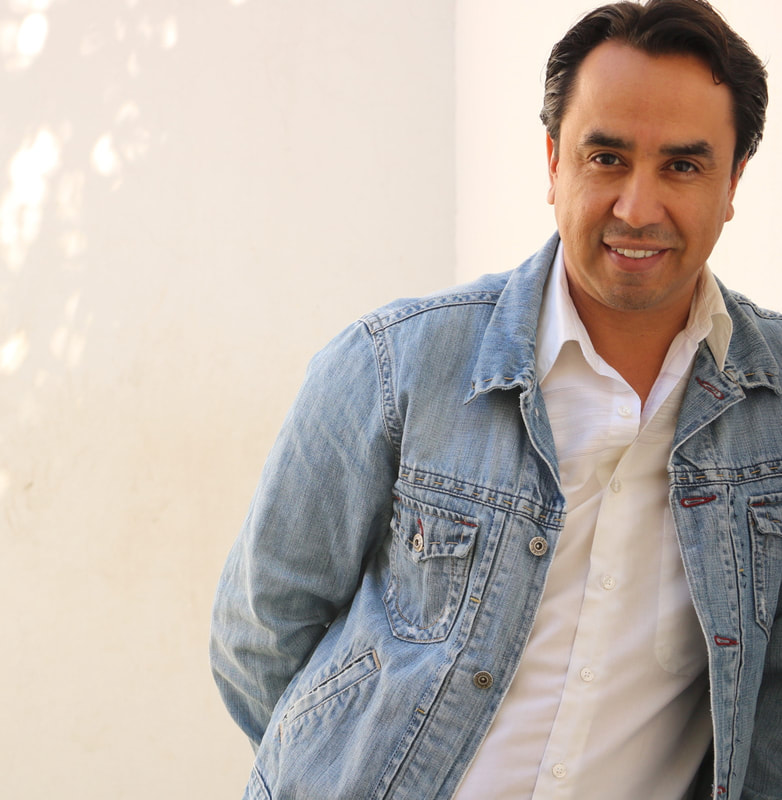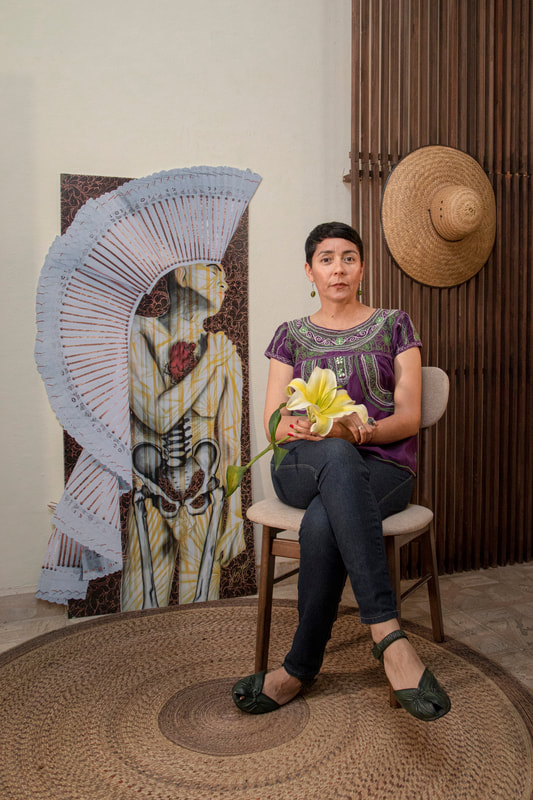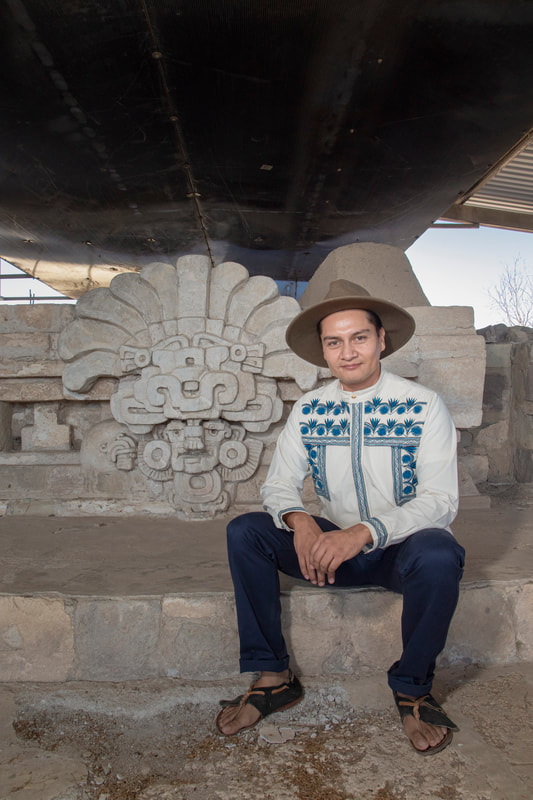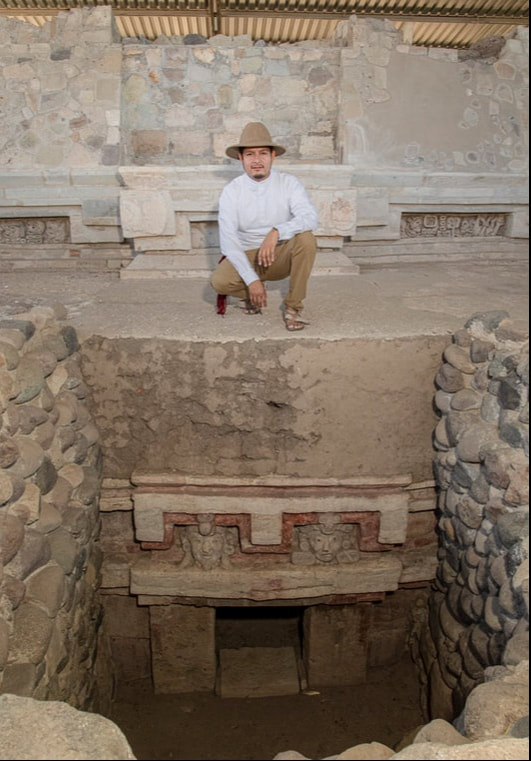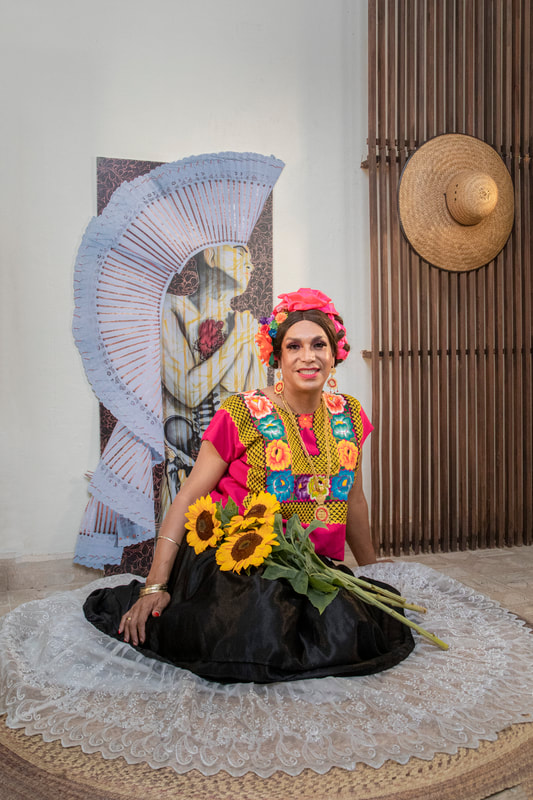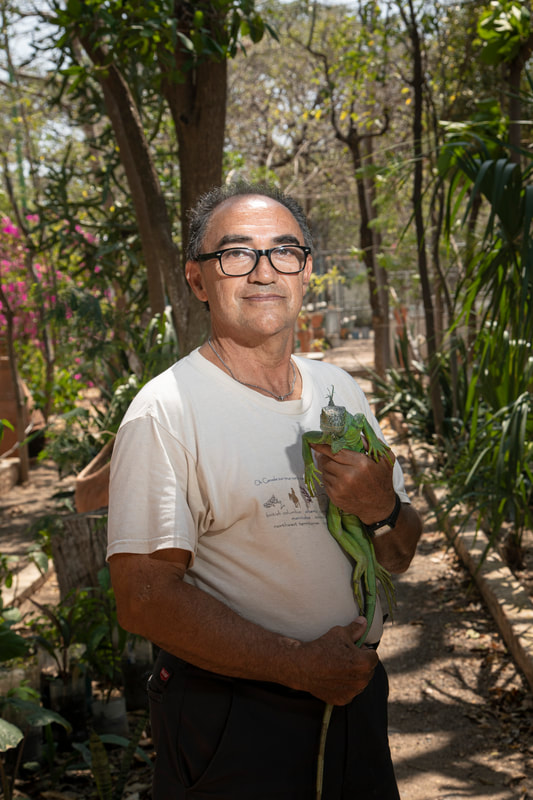~ PRODUCTION ~
As a Mexican-American artist, Hugo Ximello-Salido has always been fascinated by the dialogue between different cultures and traditions. He has found inspiration in the intersection of diverse communities and gained an appreciation for worldly interactions. Through his work, he hopes to challenge stereotypes, commercialization and commodification, and the arbitrary barriers we create between our shared humanity.
Hugo first experienced Oaxaca, Mexico as a 15 year old, traveling from his home in Guadalajara during a crucial time in the discovery of his sexuality. The vibrant culture in Oaxaca informed his journey to self-acceptance. Years later he would visit Oaxaca again - as an adult and an artist, now living in the American Midwest - and meet the Muxes. He encountered Felina and Rubi in Juchitan, and although he had little prior knowledge of Muxe and their culture, he was immediately struck by the enigmatic beauty and power that they brought to their daily lives.
Hugo remembered his journey to Oaxaca as a young man and was immediately inspired to celebrate and share in this unique and vital community - a fusion of Zapotec culture and colonial influence that created a place where gender fluidity could blossom, where self-expression could create beauty, and where art and life could converge. This meeting was the beginning of a new journey - an effort to learn about Muxe culture, appreciate its singular history and contemporary expression, and to help share its beauty with the world.
Hugo first experienced Oaxaca, Mexico as a 15 year old, traveling from his home in Guadalajara during a crucial time in the discovery of his sexuality. The vibrant culture in Oaxaca informed his journey to self-acceptance. Years later he would visit Oaxaca again - as an adult and an artist, now living in the American Midwest - and meet the Muxes. He encountered Felina and Rubi in Juchitan, and although he had little prior knowledge of Muxe and their culture, he was immediately struck by the enigmatic beauty and power that they brought to their daily lives.
Hugo remembered his journey to Oaxaca as a young man and was immediately inspired to celebrate and share in this unique and vital community - a fusion of Zapotec culture and colonial influence that created a place where gender fluidity could blossom, where self-expression could create beauty, and where art and life could converge. This meeting was the beginning of a new journey - an effort to learn about Muxe culture, appreciate its singular history and contemporary expression, and to help share its beauty with the world.
|
Juan is a creative and disciplined graphic designer who is passionate about editorial design and photography. Since receiving his Bachelor's in Graphic Design from the Universidad Mesoamericana, he has been collaborating with private and commercial clients to discover their visual styles and develop design applications based on their unique needs. He has also worked with various magazines and editorial publishing houses in Oaxaca as a photographer, designer, and editor.
Juan's personality and inspiration are sparked by his diverse background, his Zapotec Oaxaca roots, and a modern Mexican aesthetic. His photography focuses on the Muxe community, nature, and the diverse locales of Oaxaca state, from crowded markets to plazas in Oaxaca City.
He takes great pride in his vision, not only as a Mexican and Oaxacan but within his artistic approach to his subject matter. "I'm proud to showcase our Mexican roots through my photography, and particularly with the Muxe community since I'm romantically involved with a Muxe," he says.
Juan's personality and inspiration are sparked by his diverse background, his Zapotec Oaxaca roots, and a modern Mexican aesthetic. His photography focuses on the Muxe community, nature, and the diverse locales of Oaxaca state, from crowded markets to plazas in Oaxaca City.
He takes great pride in his vision, not only as a Mexican and Oaxacan but within his artistic approach to his subject matter. "I'm proud to showcase our Mexican roots through my photography, and particularly with the Muxe community since I'm romantically involved with a Muxe," he says.
Gary feels fortunate to have been involved in the production of such an innovative and creative project. Serving as assistant director has allowed him to participate at a level of production that makes him very proud to have been involved. As a lifelong educator, he has been thrilled to work with people who believe in educating the world about the Muxe community and their unique relationship to gender fluidity in such a prevalently catholic country.
Gary has a culinary passion to discover new flavors and approaches to food, which inspired the sense of adventure that he has cultivated in his life. He is also an intrepid traveler and his thirst to discover new places, aesthetics, and cultures has allowed him to see life in a different way.
Gary says, "Education and sharing is so important in this big and interconnected world. By educating others about our communities and passions, we create a sense of wonder and self-motivation when discovering new cultures, ways of living, and diverse ways of thinking."
Gary has a culinary passion to discover new flavors and approaches to food, which inspired the sense of adventure that he has cultivated in his life. He is also an intrepid traveler and his thirst to discover new places, aesthetics, and cultures has allowed him to see life in a different way.
Gary says, "Education and sharing is so important in this big and interconnected world. By educating others about our communities and passions, we create a sense of wonder and self-motivation when discovering new cultures, ways of living, and diverse ways of thinking."
Tomas Vicente Contreras is a multiligual Oaxacan/Zapotec tour guide with extensive travel experience. He is passionate about experiencing the different regions of Mexico and getting to know different cultures, histories, and traditions. Tomas is working towards opening his own business, in which he shows visitors not only traditional tourist sites but provides a fully immersive experience through which they can truly appreciate Mexican culture and traditions. Tomas believes that if people are interested in Mexican culture, they should be told the history behind it to develop a better understanding and a fuller appreciation. "I want to share Mexican culture with the world," he says.
Tomas comes from a family of artists who dedicate their lives to keep the Zapotec culture and costumes alive. Tomas is from Teotitlan del Valle, a community just an hour from Oaxaca city. He lived in the United States during high school and then returned to Mexico to focus on studies related to history, archaeology, the history of art, and cultural aspects of Oaxaca. Tomas is a certified tour guide, a designation which is given through the Secretary of Culture.
Tomas seeks to continually gain more knowledge about different parts of Oaxaca and expand his historical knowledge to other Mexican states. One of Tomas' biggest hobbies and passions is photography, and he also served as the official "behind the scenes" photographer for the documentary. He says "working as an assistant director on the documentary was a totally different experience for me, but very interesting. I was able to contribute my knowledge about the region and at the same time I acquired new skills, which I'm very grateful for."
Tomas comes from a family of artists who dedicate their lives to keep the Zapotec culture and costumes alive. Tomas is from Teotitlan del Valle, a community just an hour from Oaxaca city. He lived in the United States during high school and then returned to Mexico to focus on studies related to history, archaeology, the history of art, and cultural aspects of Oaxaca. Tomas is a certified tour guide, a designation which is given through the Secretary of Culture.
Tomas seeks to continually gain more knowledge about different parts of Oaxaca and expand his historical knowledge to other Mexican states. One of Tomas' biggest hobbies and passions is photography, and he also served as the official "behind the scenes" photographer for the documentary. He says "working as an assistant director on the documentary was a totally different experience for me, but very interesting. I was able to contribute my knowledge about the region and at the same time I acquired new skills, which I'm very grateful for."
Born to a musical family and raised in New York City, Christine Grossman began playing the violin at the age of five, piano at the age of ten, and viola at sixteen. She received both her Bachelors and Masters degrees in viola performance from the Juilliard School where she studied with Heidi Castleman, Misha Amory, and Hsin-Yun Huang. Past teachers also include Roberto Diaz, Karen Ritscher, Patti Kopec, Isaac Malkin, and Dorothy Roffman.
Ms. Grossman served as the Principal Violist with the Kansas City Symphony from 2008 until 2019. She enjoyed several solo appearances with the orchestra, including Berlioz’ Harold in Italy, an arrangement of Queen’s Bohemian Rhapsody featuring solo viola as Freddie Mercury, and most recently, Mozart’s Sinfonia Concertante.
Before moving to Kansas City, Ms. Grossman previously held positions with the Pacific Symphony, Delaware Symphony, and was a member of the New World Symphony in Miami Beach, FL. An avid chamber musician, Ms. Grossman was formerly in the California Quartet, based in San Diego. In January 2018, Ms. Grossman was featured as an “Artist to Watch” in KC Studio Magazine.
Ms. Grossman served as the Principal Violist with the Kansas City Symphony from 2008 until 2019. She enjoyed several solo appearances with the orchestra, including Berlioz’ Harold in Italy, an arrangement of Queen’s Bohemian Rhapsody featuring solo viola as Freddie Mercury, and most recently, Mozart’s Sinfonia Concertante.
Before moving to Kansas City, Ms. Grossman previously held positions with the Pacific Symphony, Delaware Symphony, and was a member of the New World Symphony in Miami Beach, FL. An avid chamber musician, Ms. Grossman was formerly in the California Quartet, based in San Diego. In January 2018, Ms. Grossman was featured as an “Artist to Watch” in KC Studio Magazine.
Brad Cox is a Kansas City-based composer and arranger, the co-founder of Owen/Cox Dance Group, and founder/director of The People’s Liberation Big Band of Greater Kansas City, a musicians’ collective dedicated to the performance of new large ensemble jazz music. His musical influences range from liturgical chant and traditional folkloric music to popular music and free jazz, with a particular interest in the communal aspects of music making. A composer in the uniquely American Ellington tradition, he has dedicated his work to forming creative collaborative relationships with musicians and to writing music for those musicians.
Cox studied composition at the UMKC Conservatory of Music and Dance under James Mobberley and Gerald Kemner and is a recipient of the 2010 Charlotte Street Foundation Generative Performing Artist Award and the 2009 Tanne Foundation Award. He currently makes music with The People’s Liberation Big Band of Greater Kansas City, a musicians' collective dedicated to the creation and performance of new large ensemble jazz, the Owen/Cox Dance Group, a contemporary dance ensemble lead by Jennifer Owen focussed on creative collaborations among dancers, musicians, composers and visual artists, and Brad Cox Octet, an eight-piece ensemble made up of two saxophonists, two bass players, two drummers, and two keyboardists.
Cox studied composition at the UMKC Conservatory of Music and Dance under James Mobberley and Gerald Kemner and is a recipient of the 2010 Charlotte Street Foundation Generative Performing Artist Award and the 2009 Tanne Foundation Award. He currently makes music with The People’s Liberation Big Band of Greater Kansas City, a musicians' collective dedicated to the creation and performance of new large ensemble jazz, the Owen/Cox Dance Group, a contemporary dance ensemble lead by Jennifer Owen focussed on creative collaborations among dancers, musicians, composers and visual artists, and Brad Cox Octet, an eight-piece ensemble made up of two saxophonists, two bass players, two drummers, and two keyboardists.
Vincent Wagner is a Kansas City-based writer and theatre artist who is passionate about using storytelling to entertain, educate, and inspire audiences. He believes in the power of the written and spoken word to connect communities, stir the imagination, and create internal and external change. He works with writing clients across diverse industries to develop customized content that provides value and provokes action.
Vincent's background and foundational passion is in theatre. He earned a BA in Theatre Performance from Fordham College at Lincoln Center, which is where he met his husband Ian, a theatre director and designer. He returned home to Kansas City when he was accepted into the MFA Acting & Directing program at the University of Missouri - Kansas City.
In addition to theatre, film, and writing, Vincent enjoys spending time outdoors with friends, working with Ian on their house and garden, and reading fantasy and science fiction novels. He has greatly enjoyed being a part of the documentary team and learning more about Oaxaca and the Muxe community.
Vincent's background and foundational passion is in theatre. He earned a BA in Theatre Performance from Fordham College at Lincoln Center, which is where he met his husband Ian, a theatre director and designer. He returned home to Kansas City when he was accepted into the MFA Acting & Directing program at the University of Missouri - Kansas City.
In addition to theatre, film, and writing, Vincent enjoys spending time outdoors with friends, working with Ian on their house and garden, and reading fantasy and science fiction novels. He has greatly enjoyed being a part of the documentary team and learning more about Oaxaca and the Muxe community.
Alej Martínez is an author poet living and making nonsense in Kansas City. A graduate of Prescott College’s Sustainable Food Systems B.A. Born in jarocho land, Alej unsettled in the US at a young age. They write about the unearthing of trauma and social issues that affect them and their communities, including gender, sexuality, displacement, and dismemberment. His debut anthology, Disclosure: Confessions of a Queer in Crisis, was independently published in 2018. Followed by Disclosure in 2021 through Resistencia Press. Some of Alej's pieces have appeared in the Harbor-Review, Hawaii Review, Semillas Publishing, Immigrant Made Zine, KC Studio, and About A Place Journal. More recently, Alej spent time shedding, rematriating, and healing in the Southwest; they also spent two summers growing food in Taos, NM. Currently, they work with Kansas community to address infrastructure and community resiliency and most importantly, they intentionally focus on simply living, and expressing themselves in healing ways.
Always committed to culture, I was born and raised in Tlaquepaque, Jalisco. Land of crafts, I grew up living with colors, textures, shapes and art that is experienced in this place, pottery cradle with streets, galleries and mansions worth visiting. Immersed in the work to create a better world, I am passionate about knowing new places and cultures, in my free time I visit new communities to fill myself with good moments, energies, landscapes and people, as well as be in contact with nature.
Graphic Designer graduated from the University of Guadalajara in 2005. Design, printing and photography are the work pillars which they revolve around my life,
focused on art for advertising, web design and print. I come from a printing dynasty since my great-grandfather was in printing at El MURAL; grandfather, uncles, cousins and mother, have continued the legacy and we are each generation a connection with ink and paper. Each member of my family worked in the printing press as his first job, they came in as office boys and ended up finding their abilities to heading into their future work, 80 years ago designs were by hand and the letters were engraved on metal plates to make line by line,
and being put into a press now life led us to design in a computer and print on a printer 4 colors, the result is the same beautiful bright and functional prints.
Creative designer in 2000 for the TEVHA brand, currently content designer for McCarthy's Irish Pub Brand. Product photographer for the web for the Texas company Laguna Madre Traders. Collaborator every year at the FIL (International Book Fair of Guadalajara) from 2009 to date, the last broadcast in 2023 with guest country European Union.
Graphic Designer graduated from the University of Guadalajara in 2005. Design, printing and photography are the work pillars which they revolve around my life,
focused on art for advertising, web design and print. I come from a printing dynasty since my great-grandfather was in printing at El MURAL; grandfather, uncles, cousins and mother, have continued the legacy and we are each generation a connection with ink and paper. Each member of my family worked in the printing press as his first job, they came in as office boys and ended up finding their abilities to heading into their future work, 80 years ago designs were by hand and the letters were engraved on metal plates to make line by line,
and being put into a press now life led us to design in a computer and print on a printer 4 colors, the result is the same beautiful bright and functional prints.
Creative designer in 2000 for the TEVHA brand, currently content designer for McCarthy's Irish Pub Brand. Product photographer for the web for the Texas company Laguna Madre Traders. Collaborator every year at the FIL (International Book Fair of Guadalajara) from 2009 to date, the last broadcast in 2023 with guest country European Union.
~ MUXE TALENTS ~
Before opening her makeup academy, Amitai Studios, Amitai worked for several years for an important cosmetic brand in Mexico after becoming a makeup artist in Oaxaca City. She is also an outspoken advocate and a spokeperson for her community and is proud to represent muxe in a professional way. Amitai was featured in El Universal Mexico, a prominent newspaper with millions of readers, which opened many doors for her - not only as an artist but to prominently represent her muxe identity and community.
In addition to advocacy, Amitai is a writer, photographer, and drag performer. She notes that her creativity is the key to her development as an artist. Amitai was invited to be part of the reality show “Toma mi Dinerita,” hosted by Pepe and Teo, and that opportunity helped her to advance her career in drag. She was invited to perform across Mexico, but due to the pandemic, the tour has been postponed. Amitai says “I love my muxe identity because it is dual and has fluidity. I am proud that I can be recognized for my success and goals not as a man or woman but as a muxe.”
In addition to advocacy, Amitai is a writer, photographer, and drag performer. She notes that her creativity is the key to her development as an artist. Amitai was invited to be part of the reality show “Toma mi Dinerita,” hosted by Pepe and Teo, and that opportunity helped her to advance her career in drag. She was invited to perform across Mexico, but due to the pandemic, the tour has been postponed. Amitai says “I love my muxe identity because it is dual and has fluidity. I am proud that I can be recognized for my success and goals not as a man or woman but as a muxe.”
Victoria dedicates her life to promoting the understanding of her community and her identity as a muxe, saying “I’m very proud to be a muxe and an example to others to be who they really are.” Victoria is also an antique huipil (a traditional garment worn by women in Central America) merchant and has been growing her business for years. She hopes to spread her appreciation for these types of huipiles, which aren’t made anymore due to their complexity and fine thread. She is very proud of her indigenous Zapotecan roots and she embraces them every day.
Victoria has been featured in numerous articles in Mexico and has been appointed to represent the Muxe community in several locations in Oaxaca. She was also featured in Vogue Mexico last year and has been asked to be in other publications abroad. Victoria has a natural talent for cosmetology, which she practices in Juchitan de Zaragoza. She has participated in “Con Muxe Orgullo,” Juchitan’s gay pride event. Her hobbies involve listening to music, having a good time with friends, and one of her passions is to incorporate the huipil in more modern outfits for everyday wear.
Victoria has been featured in numerous articles in Mexico and has been appointed to represent the Muxe community in several locations in Oaxaca. She was also featured in Vogue Mexico last year and has been asked to be in other publications abroad. Victoria has a natural talent for cosmetology, which she practices in Juchitan de Zaragoza. She has participated in “Con Muxe Orgullo,” Juchitan’s gay pride event. Her hobbies involve listening to music, having a good time with friends, and one of her passions is to incorporate the huipil in more modern outfits for everyday wear.
Felina is a continual defender of Muxe identity and the customs and traditions of her people. For more than 25 years, she has fought for respect for the human rights of her Zapotecan muxe sisters. A social activist with a long history addressing Muxe themes, Felina has participated as a lecturer in TED Mexico and in multiple interviews, documentaries, and conferences in Mexico and abroad; including in Austria, Italy, France, Argentina, and at important universities such as the Faculty of Philosophy and Letters in Brazil.
Felina is the Director of Public Policies for Sexual Diversity for the Juchitan City Council and was a candidate for the local council in the Juchitan district of Zaragoza in 2018. She is also a representative of the Association of the Fearless Against AIDS and current President of the Muxe association called The Authentic Intrepid Danger Seekers.
Felina is the Director of Public Policies for Sexual Diversity for the Juchitan City Council and was a candidate for the local council in the Juchitan district of Zaragoza in 2018. She is also a representative of the Association of the Fearless Against AIDS and current President of the Muxe association called The Authentic Intrepid Danger Seekers.
Rubi holds a degree in education and is the director of a preschool in the community of Chahuite, Oaxaca. Rubi says that “Being a muxe is my proudest identity. As a unique being, I see being Muxe as my way to contribute to my community - to improve it and develop it.”
Rubi has had the opportunity to represent her Muxe community in many regions of Oaxaca as well as in Mexico City. One of their upcoming presentations is a virtual educational event that will be streamed in Monterrey state. Rubi feels a sense of duty to educate students and faculty about the Muxe and LGBTQ+ communities. When not working in her community, Rubi loves to read and watch art films.
Rubi has had the opportunity to represent her Muxe community in many regions of Oaxaca as well as in Mexico City. One of their upcoming presentations is a virtual educational event that will be streamed in Monterrey state. Rubi feels a sense of duty to educate students and faculty about the Muxe and LGBTQ+ communities. When not working in her community, Rubi loves to read and watch art films.
Estrella is the Director of the Diversity Directorate of Juchitán de Zaragoza. Her work as an activist includes marches for equality and non-discrimination in the states of Oaxaca, Mexico City and Guerrero. In June 2021, Estrella participated in the event held at the St. Regis Mexico City Hotel, an assembly about the importance of Pride Month, its struggle, and history.
Estrella dedicates her career to promote a better understanding of her Muxe identity. Her story became the cover of Vogue Mexico in December 2019. ~ Estrella says “I am Muxe, and I belong to a community of indigenous women called Juchitán de Zaragoza, located in the region of the Isthmus of Tehuantepec, Oaxaca. Where women, men, and Muxes currently coexist harmoniously and respectfully."
“The Muxe has a very important role in the family and festivities. For example, in the celebration of Velas (an annual celebration), it is a key piece in the ethno symbolic identity of the Zapotecs, for having a special respect for the mother" Estrella said.
In 2021 Estrella participated in the film "Finlandia", a film whose premiere took place in the state of Oaxaca and was particularly projected in an indigenous region where the Chontales, Mixes and Zapotec indigenous peoples reside. Her participation in literary collections such as the book “Mexicanas Chidas”, the magazine “Cuarto Oscuro” and her involvement in the launch of the magazine “Be” and the first LGBT+ tourist tour in Pride Month 2021 in CDMX. They have given him the opportunity to expand and share her career as a Muxe activist.
Estrella dedicates her career to promote a better understanding of her Muxe identity. Her story became the cover of Vogue Mexico in December 2019. ~ Estrella says “I am Muxe, and I belong to a community of indigenous women called Juchitán de Zaragoza, located in the region of the Isthmus of Tehuantepec, Oaxaca. Where women, men, and Muxes currently coexist harmoniously and respectfully."
“The Muxe has a very important role in the family and festivities. For example, in the celebration of Velas (an annual celebration), it is a key piece in the ethno symbolic identity of the Zapotecs, for having a special respect for the mother" Estrella said.
In 2021 Estrella participated in the film "Finlandia", a film whose premiere took place in the state of Oaxaca and was particularly projected in an indigenous region where the Chontales, Mixes and Zapotec indigenous peoples reside. Her participation in literary collections such as the book “Mexicanas Chidas”, the magazine “Cuarto Oscuro” and her involvement in the launch of the magazine “Be” and the first LGBT+ tourist tour in Pride Month 2021 in CDMX. They have given him the opportunity to expand and share her career as a Muxe activist.
Naomy comes from a very close family. Her mother and father created a safe environment for her while growing up, evolving into the Muxe and trans activist that she is nowadays. Naomy was part of the first Center of Sexual Diversity in her native town Juchitan de Zaragoza, Oaxaca. Moreover, she was part of many clinics promoting the prevention of sexually transmitted diseases in the region of the Isthmus of Tehuantepec.
Naomy says, “currently, I continue to carry out activities in favor of sexual diversity, and it is my personal goal to continue the fight to improve human rights in my state."
As a trans woman and Muxe, Naomy has been an avid member of sexual diversity rights. She became part of several panels representing the trans community in the state of Oaxaca. Her participation helped the opening of diverse spaces where the trans community could be heard. In 2017, she obtained her gender affirmation and is currently registered under the name of Naomy Mendez Romero. Subsequently, in 2019, representing the state of Oaxaca, she was awarded the “Rostros” award given by the foundation “Fundación y Rostros A.C.”
Naomy says, “currently, I continue to carry out activities in favor of sexual diversity, and it is my personal goal to continue the fight to improve human rights in my state."
As a trans woman and Muxe, Naomy has been an avid member of sexual diversity rights. She became part of several panels representing the trans community in the state of Oaxaca. Her participation helped the opening of diverse spaces where the trans community could be heard. In 2017, she obtained her gender affirmation and is currently registered under the name of Naomy Mendez Romero. Subsequently, in 2019, representing the state of Oaxaca, she was awarded the “Rostros” award given by the foundation “Fundación y Rostros A.C.”
Xaneri Merino Damian (1995) Ñuu savi / Binnizá
She studied Communication and Culture at the Autonomous University of Mexico City (2014-2020). Shee was a beneficiary of a scholarship awarded by Conacyt in the project “Complexity of technological innovation in urban agriculture” (2020). In 2021, she obtained support to collaborate with community weavers in San Pedro Jicayán, Oaxaca, where she offered some workshops on brocades and embroidery. She is currently in her graduation process with his Thesis: Dynamics of the Ra'i Ñaj Si'i on the backstrap loom of San Pedro Jicayán.
Highlight:
“Identity and difference” at Galería Oscar Román (CDMX, 2020), “MOG, pride month” at the Consulate General of Mexico in Miami (2020), “We are profound” at the W Mexico City hotel. (CDMX, 2020), “Ritual to heal” collective Mueganxs (CDMX, 2021), Homosensual (Article): Damián Gerardo: artisan muxe, muxeidad and muxe love (CDMX, 2021), The day (Article): Young muxe promotes crafts textile on its social networks (CDMX, 2021), Coolhunterx (Article): Handmade textiles, backstrap loom and LGBT+ identities (CDMX, 2021), INALI dialogue table: “Preservation of textiles from new gender dynamics” (CDMX, 2021) ), “Original” Sale of textiles and catwalk (CDMX, 2021), Podcasts: Mixteco (CDMX, 2021), Interview: Between the caracol and the coyuchi: Textiles de San Pedro Jicayán (CDMX, 2021), Chilango Magazine (Article) : Always in spring (CDMX, 2022). You are Pride, CDMX campaign (2023), Inclusive linguistics: talk (CDMX, 2023), Indigenous peoples and sexual diversity, experiences, challenges and tasks INPPI (Puebla, 2023), Conversation: Fashion and gender identity (PUEBLA, 2023) .
She studied Communication and Culture at the Autonomous University of Mexico City (2014-2020). Shee was a beneficiary of a scholarship awarded by Conacyt in the project “Complexity of technological innovation in urban agriculture” (2020). In 2021, she obtained support to collaborate with community weavers in San Pedro Jicayán, Oaxaca, where she offered some workshops on brocades and embroidery. She is currently in her graduation process with his Thesis: Dynamics of the Ra'i Ñaj Si'i on the backstrap loom of San Pedro Jicayán.
Highlight:
“Identity and difference” at Galería Oscar Román (CDMX, 2020), “MOG, pride month” at the Consulate General of Mexico in Miami (2020), “We are profound” at the W Mexico City hotel. (CDMX, 2020), “Ritual to heal” collective Mueganxs (CDMX, 2021), Homosensual (Article): Damián Gerardo: artisan muxe, muxeidad and muxe love (CDMX, 2021), The day (Article): Young muxe promotes crafts textile on its social networks (CDMX, 2021), Coolhunterx (Article): Handmade textiles, backstrap loom and LGBT+ identities (CDMX, 2021), INALI dialogue table: “Preservation of textiles from new gender dynamics” (CDMX, 2021) ), “Original” Sale of textiles and catwalk (CDMX, 2021), Podcasts: Mixteco (CDMX, 2021), Interview: Between the caracol and the coyuchi: Textiles de San Pedro Jicayán (CDMX, 2021), Chilango Magazine (Article) : Always in spring (CDMX, 2022). You are Pride, CDMX campaign (2023), Inclusive linguistics: talk (CDMX, 2023), Indigenous peoples and sexual diversity, experiences, challenges and tasks INPPI (Puebla, 2023), Conversation: Fashion and gender identity (PUEBLA, 2023) .
Elvis Guerra, Zapotec poet and translator. Juchitán de Zaragoza, Oaxaca. 1993. His poems have been published in various magazines and anthologies. In 2015 he won the CaSa Literary Creation in Zapotec Language award with the title Zuyubu'/Buscarás.
He is the author of the books “Xtiidxa' ni ze'/ Declaration of absence” (2018); “Ramonera” (Poetry Circle, 2019) and 2020, Letraversal, Spain.
Muxitán (2022, UNAM Tiger Wing collection). Cuyube’ ti nguiiu/ in search of a man (Secretary of Public Education of Mexico SEP, 2023). As a translator he published the book Guidiladi Yaase'/Piel Oscura, erotic stories in Zapotec (2017). He was a Scholar of the National Fund for Culture and the Arts (FONCA) in the Young Creators program, in the periods 2016-2017 and 2018-2019. His poems have been translated into English, Ayöök and Swedish.
He is the author of the books “Xtiidxa' ni ze'/ Declaration of absence” (2018); “Ramonera” (Poetry Circle, 2019) and 2020, Letraversal, Spain.
Muxitán (2022, UNAM Tiger Wing collection). Cuyube’ ti nguiiu/ in search of a man (Secretary of Public Education of Mexico SEP, 2023). As a translator he published the book Guidiladi Yaase'/Piel Oscura, erotic stories in Zapotec (2017). He was a Scholar of the National Fund for Culture and the Arts (FONCA) in the Young Creators program, in the periods 2016-2017 and 2018-2019. His poems have been translated into English, Ayöök and Swedish.
Franzua Ruiz is Espinaleña born from a Juchitéc womb. She did her educational training in both Espinal and Ciudad Ixtepec. She is currently a PAAE worker, in a kindergarten in the 7th section. For more than 10 years now, she have been blessed with the art of her Zapotec culture; venturing into her beginnings as a regional hairdresser, a complement to the clothing of Istmeño women; and then she discover the precious textile art, designing and starching the ruffles and Resplandores in their different variants.
She had participated more than eight times in the Oaxacan Guelaguetza, Franzua had been a participant in different artistic expressions, as a dancer and in charge of all the clothing designing. At 22 years old, she began in very small degree, once she gained the financial means and in 2016 she was able to be queen of the Vela Muxe of El Espinal, which fights for the visibility of her community in a town with a high rate of homophobia and transphobia.
"For me, being a muxe is being free, it is loving and being loved in my language, in my body and in my people. Getting dressed is always taking a step forward, showing people that we are human beings and can do everything we set our minds to, fighting to do it in a place free of complexes and without being singled out or discriminated against, assuming that rights are not asked for, They are taken and respected. I like to be a friendly person, always sharing with those I love, in an environment of respect, with the treatment that any person deserves." Franzua said.
She had participated more than eight times in the Oaxacan Guelaguetza, Franzua had been a participant in different artistic expressions, as a dancer and in charge of all the clothing designing. At 22 years old, she began in very small degree, once she gained the financial means and in 2016 she was able to be queen of the Vela Muxe of El Espinal, which fights for the visibility of her community in a town with a high rate of homophobia and transphobia.
"For me, being a muxe is being free, it is loving and being loved in my language, in my body and in my people. Getting dressed is always taking a step forward, showing people that we are human beings and can do everything we set our minds to, fighting to do it in a place free of complexes and without being singled out or discriminated against, assuming that rights are not asked for, They are taken and respected. I like to be a friendly person, always sharing with those I love, in an environment of respect, with the treatment that any person deserves." Franzua said.
~ PROFESSIONALS ~
Dr. Heriberto received his Doctorate in Ibero-American Studies from the Faculty of Political Sciences and Sociology of the Complutense University of Madrid, and a postgraduate degree in Regionalism, Social Development, and Borders at the University of Buenos Aires through the Cooperation Office of the European Union for Latin America. He is a full-time Research Professor at the Institute for Sociological Research of the Autonomous University "Benito Juárez" of Oaxaca, attached to the Academic Body of Political Studies, where he develops studies surrounding the research of Power, Coloniality, and Territory.
Heriberto is a member of the National System of Researchers (SNI) and was coordinator of the South-Southeast region of the Mexican Council of Social Sciences (2016-2019). He focuses his academic and research interests on issues of the construction of political identities, ethno-nationalisms, and decolonial processes of indigenous peoples and Afro-descendants of Latin America from political geography and critical geopolitics.
His recent publications include "Against invisibilization: socio-political organization and multiple forms of public expression", Ed. Gedisa (2020); “Production of the Afro-descendant space in the Lagunas de Chacahua National Park” (2019); “Dialogues of Afro-Latino indigenous (re) existence: Possible decolonialities” (2018); Epistemic Resistance: Intelligentsia and political identity in the decolonial project ñuu savi (2017); "The Afro-Mexican Council: crossroads of political identities and opportunities" in Politics and Resistance Strategies (2017); "Colonial difference and Toltecáyotl. Decolonize theories of power in Mexico", in Politics and alternatives to the capitalist crisis (2017), “Afro-descendants, coloniality and civil society in Oaxaca”, in Rural civil society in Mexico ”(1016),“ State Violence, Ideology and Torture ”, in Oaxaca 2006-2010: antagonism, subjectivities and hope (2016).
Heriberto is a member of the National System of Researchers (SNI) and was coordinator of the South-Southeast region of the Mexican Council of Social Sciences (2016-2019). He focuses his academic and research interests on issues of the construction of political identities, ethno-nationalisms, and decolonial processes of indigenous peoples and Afro-descendants of Latin America from political geography and critical geopolitics.
His recent publications include "Against invisibilization: socio-political organization and multiple forms of public expression", Ed. Gedisa (2020); “Production of the Afro-descendant space in the Lagunas de Chacahua National Park” (2019); “Dialogues of Afro-Latino indigenous (re) existence: Possible decolonialities” (2018); Epistemic Resistance: Intelligentsia and political identity in the decolonial project ñuu savi (2017); "The Afro-Mexican Council: crossroads of political identities and opportunities" in Politics and Resistance Strategies (2017); "Colonial difference and Toltecáyotl. Decolonize theories of power in Mexico", in Politics and alternatives to the capitalist crisis (2017), “Afro-descendants, coloniality and civil society in Oaxaca”, in Rural civil society in Mexico ”(1016),“ State Violence, Ideology and Torture ”, in Oaxaca 2006-2010: antagonism, subjectivities and hope (2016).
Dr. Curiel earned a bachelor's degree in History at the Autonomous University of Baja California, a Master's degree at the Center for Research and Higher Studies of Social Anthropology in Guadalajara, Jalisco, and obtained her doctorate from the Rural Development Sociology Group of the University of Wageningen, Holland.
Between 2001 and 2011, Charlynne conducted research on issues of gender relations, community, politics, power, ritual, the effects of transnational organizations, and internal normative systems as a politics of recognition in the Mixtec region of Oaxaca. In March 2012, she joined the UABJO Institute for Sociological Research as a full-time professor-researcher, where she teaches a degree in social anthropology and a master's degree in sociology, and in whose teaching programs she has given courses and seminars on introduction to feminist theory and gender studies.
Charlynne is currently developing food chain studies within social anthropology, investigating the relationships and practices that create ways of producing and consuming food in the city of Oaxaca that try to move away from the productivist and industrialized paradigm. She has recently started a project on the relationship between women, food, and nutrition with a feminist perspective.
Dr. Curiel is a member of the Gender, Culture, and Development Academic Body, and part of the Network for Gender Equality that contributed to the creation of the protocol for the care of victims of discrimination and sexual violence at UABJO. She has also been a visiting professor in the masters program in Social Anthropology of the CIESAS-Pacífico Sur and collaborates as a teacher at the School for Women's Freedom. Since 1994, she has supported the actions of the Zapatista communities which she has visited on numerous occasions and in Oaxaca she is an advocate in the fight against sexist violence and for women’s right to choice.
Between 2001 and 2011, Charlynne conducted research on issues of gender relations, community, politics, power, ritual, the effects of transnational organizations, and internal normative systems as a politics of recognition in the Mixtec region of Oaxaca. In March 2012, she joined the UABJO Institute for Sociological Research as a full-time professor-researcher, where she teaches a degree in social anthropology and a master's degree in sociology, and in whose teaching programs she has given courses and seminars on introduction to feminist theory and gender studies.
Charlynne is currently developing food chain studies within social anthropology, investigating the relationships and practices that create ways of producing and consuming food in the city of Oaxaca that try to move away from the productivist and industrialized paradigm. She has recently started a project on the relationship between women, food, and nutrition with a feminist perspective.
Dr. Curiel is a member of the Gender, Culture, and Development Academic Body, and part of the Network for Gender Equality that contributed to the creation of the protocol for the care of victims of discrimination and sexual violence at UABJO. She has also been a visiting professor in the masters program in Social Anthropology of the CIESAS-Pacífico Sur and collaborates as a teacher at the School for Women's Freedom. Since 1994, she has supported the actions of the Zapatista communities which she has visited on numerous occasions and in Oaxaca she is an advocate in the fight against sexist violence and for women’s right to choice.
Originally from the Central Valleys of Oaxaca, holds a degree in Archeology from the University of the Americas Puebla (UDLAP) and a Master's degree in Real Estate Conservation at the Regional University of the Southeast (URSE Oaxaca). From 2012 to 2017 he collaborated in the Atzompa Monumental Complex Archaeological Project. Since 2018, he has been responsible for the Archaeological Corridor of the Tlacolula Valley (COVATLAO), an operational program of the INAH Oaxaca Center for the research, protection, conservation and dissemination of the archaeological zones open to the public in the Tlacolula Valley: Mitla, Yagul, Lambityeco and Dainzú; as well as manager of the Yagul and Mitla Prehistoric Caves site in the Central Valleys of Oaxaca, inscribed on the UNESCO World Heritage List on August 1, 2010. He has coordinated conservation and community management projects in Teotitlán del Valle, San Mateo Macuilxóchitl, Tlacolula de Matamoros, Unión Zapata and San Pablo Villa de Mitla and has published articles in magazines such as Arqueología Segunda Época (INAH), Arqueología Mexicana (Raíces), Cuadernos del Sur (CIESAS-UABJO-INAH) and Mexicon (Germany). He has lectured on the archeology of the Valley of Oaxaca, especially Zapotec effigy vessels, ceramics, writing and iconography, and on the Mesoamerican ball game and Pelota Mixteca.
Originally from Valles Centrales, Oaxaca, from the Mitla and Tlacolula communities. Graduate in Information and Telecommunications Technologies, master in Business Administration, both studies from the Anáhuac University, graduate in Philosophy and Social Sciences, and master in Philosophy and Social Sciences, with a specialty in religion, both studies from ITESO, Jesuit university of Guadalajara. From 2013 to 2020 he worked with the company of Jesus, Jesuits, in Mexico, developing community work and reconstruction of the social fabric in marginal areas and high violence in indigenous communities (Tzeltales, Tzotziles, Zapotecs, Mixtecs) in vulnerable situations, in the states of: Sonora, Coahuila, Chiapas, Jalisco, Mexico City and Oaxaca. Professor of humanities at the Universidad Anáhuac Oaxaca, anthropology, leadership and philosophy. Since the beginning of 2023, he has been in charge of disseminating and linking the Archaeological Corridor of the Tlacolula Valley of the National Institute of Anthropology and History, INAH, COVATLAO. He has provided training in cultural and heritage management, anthropology of religion. He has developed linkage projects with universities for social impact. His research topics are: sacred spaces, cultural commodification, education and religion from phenomenology and anthropology.
Melissa Mijangos Boijseauneau Originally from Santiago Jamiltepec Oaxaca. Muxe/costeña- Hold a Bachelor's degree in Law and Social Sciences from The Autonomous University of Oaxaca Lawyer by profession, first Trans lawyer to change her identity in the city of Oaxaca de Juárez Oaxaca center. Legal advisor at CESIDA. External advisor in the Attorney General's Office. Promoter of respect and inclusion campaign of the LGBTTIQY. Sexual awareness and guidance workshop public ministries of the attorney general of the state of Oaxaca. Head of elderly person unit. 2019 to date, teacher in Gender Issues at the Institute of Police of the state of Oaxaca.
She was the first Trans lawyer to have a job in the government of the State of Oaxaca .In 2016, she changed her professional title and ID that accredits her as Melissa. In 2022 she was queen of the authentic intrepid seekers of danger, the maximum party in Latin America of the muxe community. She has held different public positions in the government of the state of Oaxaca. She currently works as a trial lawyer defending the rights of sexual diversity and is looking forward to being a professor at the Faculty of Law and Social Sciences of the Benito Juárez Autonomous University of Oaxaca.
She was the first Trans lawyer to have a job in the government of the State of Oaxaca .In 2016, she changed her professional title and ID that accredits her as Melissa. In 2022 she was queen of the authentic intrepid seekers of danger, the maximum party in Latin America of the muxe community. She has held different public positions in the government of the state of Oaxaca. She currently works as a trial lawyer defending the rights of sexual diversity and is looking forward to being a professor at the Faculty of Law and Social Sciences of the Benito Juárez Autonomous University of Oaxaca.
Biologist Eduardo Martínez Noriega finished his studies in Metropolitan Autonomous University-Iztapalapa Bachelor of Biology. He carried out his Social Service at SEDESOL in the program: Vegetative and germinative propagation of epiphytes from the izotal in the valley of Zapotitlan Puebla. 1997. In the Division of Biological and Health Sciences Universidad Autónoma Metropolitana-Iztapalapa he developed the project “Aspects of Eco-physiology of Tillandsia califani Rauh” under the advice of M. en C. María Dolores García Suárez. November 1998. He has participated in different conferences, invited as a jury, held workshops, talks and conferences at different educational institutions.
He has held positions such as Director of the “IMAN” Community Development Center dependent on the General Directorate of Social Development Coyoacán. Director of the “CULHUACANES” Community Development Center dependent on the General Directorate of Social Development Coyoacán. Zone Coordinator 1 National Institute of Statistics, Geography and Informatics (INEGI) State Coordination 1, State Statistics Subdirectorate. Environmental Education Coordinator Ecology Registry H. Heroic Constitutional Municipal City Council of the City of Juchitán de Zaragoza, Oaxaca 2011-2013. Environmental Education Coordinator Ecology Registry H. Heroic Constitutional Municipal City Council of the City of Juchitán de Zaragoza, Oaxaca 2017-2018. Ecological Planning Coordinator Ecology Registry H. Heroic Constitutional Municipal Council City of Juchitán de Zaragoza, Oaxaca 2019-2021.
At the moment Biologist Martínez Noriega is the Director of the Environmental Education Center “Julio Bustillo Cacho” Juchiteco Ecological Forum, City of Juchitán de Zaragoza, Oaxaca.
He has held positions such as Director of the “IMAN” Community Development Center dependent on the General Directorate of Social Development Coyoacán. Director of the “CULHUACANES” Community Development Center dependent on the General Directorate of Social Development Coyoacán. Zone Coordinator 1 National Institute of Statistics, Geography and Informatics (INEGI) State Coordination 1, State Statistics Subdirectorate. Environmental Education Coordinator Ecology Registry H. Heroic Constitutional Municipal City Council of the City of Juchitán de Zaragoza, Oaxaca 2011-2013. Environmental Education Coordinator Ecology Registry H. Heroic Constitutional Municipal City Council of the City of Juchitán de Zaragoza, Oaxaca 2017-2018. Ecological Planning Coordinator Ecology Registry H. Heroic Constitutional Municipal Council City of Juchitán de Zaragoza, Oaxaca 2019-2021.
At the moment Biologist Martínez Noriega is the Director of the Environmental Education Center “Julio Bustillo Cacho” Juchiteco Ecological Forum, City of Juchitán de Zaragoza, Oaxaca.

